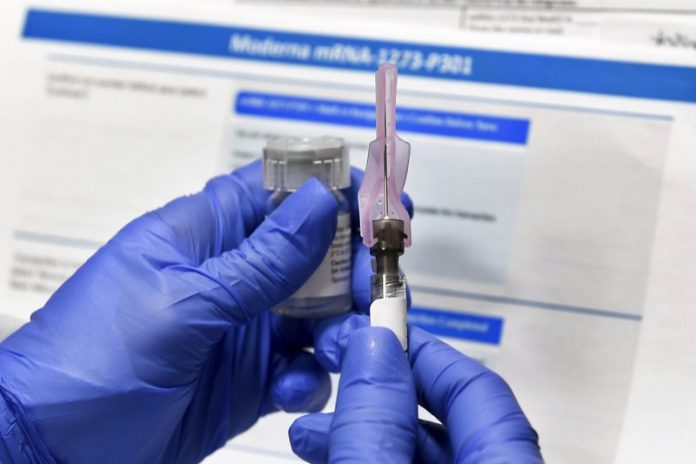The Ontario government has developed a three-phase implementation plan to receive, store and administer COVID-19 vaccines to Ontarians as soon as they are received. Phase One will begin on Tuesday, December 15, 2020 with a pilot project in Toronto and Ottawa which will include the vaccination of over 2,500 health care workers with the Health Canada approved Pfizer-BioNTech vaccine.
Details were provided today by Premier Doug Ford, Christine Elliott, Deputy Premier and Minister of Health, Solicitor General Sylvia Jones and General Rick Hillier (retired), Chair of the COVID-19 Vaccine Distribution Task Force.
“We are ready to receive these vaccines as soon as they become available thanks to the excellent work of our health care officials and General Hillier and the COVID-19 Vaccine Distribution Task Force,” said Premier Ford. “We have one of the most robust and comprehensive plans in the country and I am confident that all the necessary security measures and the advanced logistics systems are in place. The progress we are making is a welcome sign, but we must continue to be vigilant and follow the public health guidelines until vaccines are widely available.”
As part of Phase One, Ontario will be participating in a COVID-19 vaccine readiness pilot in collaboration with the Public Health Agency of Canada and Pfizer-BioNTech. Two pilot sites at University Health Network in Toronto and The Ottawa Hospital will receive doses of the Pfizer vaccine to be administered to health care workers who are providing care in hospitals and long-term care homes.
This pilot will help inform the province’s preparedness plan to receive larger vaccine quantities as it moves forward in Phase One, providing the opportunity to test the logistics of delivery, reconstitution of the vaccine, clinic management, and post-vaccine surveillance. The pilot also affords the opportunity to learn from the experiences of those being immunized so lessons learned can be shared with sites that will receive the vaccine in the coming weeks and months.
The two locations were selected for the pilot because this will test the travel logistics in two different regions of the province. In addition, these sites already have the equipment necessary to safely store the Pfizer vaccine at -70 degrees and the trained staff to handle the vaccine. Since this vaccine cannot be transferred beyond the initial delivery location at this time, vaccinations will be administered to health care workers in high-risk areas such as long-term care and critical care units in the Toronto and Ottawa regions.
“Keeping everyone safe is our top priority and this vaccine is Health Canada approved and ready to be administered,” said Minister Elliott. “By vaccinating and protecting people who provide essential care in hospitals and long-term care homes, we will decrease the risk of COVID-19 outbreaks in these settings. Thank you to our frontline heroes, volunteers, and to all the researchers who made this vaccine possible. As we continue to receive more doses, we will ensure that every person who wants a vaccine will receive one.”
Phase One will continue with the following key milestones:
Based on per capita allocations, an expected 90,000 Pfizer-BioNTech doses received from the federal government will be delivered to up to 14 hospital sites in Grey-Lockdown and Red-Control zones in December, to vaccinate health care workers in hospitals, long-term care homes, retirement homes and other congregate settings caring for seniors.
Deliveries of an expected 35,000 to 85,000 doses of the Moderna vaccine, once approved, will enable vaccinations to be expanded to long-term care homes in the Grey-Lockdown areas.
In early 2021, expansion of additional hospital sites providing the Pfizer-BioNTech vaccine in Grey-Lockdown and Red-Control zones, with continued vaccination provided to health care workers and, with the appropriate safety protocols, to long-term care home and retirement home residents.
It is anticipated that by end of January over 20 hospitals across the province will be administering the Pfizer vaccine.
An expansion of the number of locations to administer the Moderna vaccine would include long-term care homes, retirement homes, public heath units, other congregate care settings for seniors, and adults in First Nations, Métis and Indigenous populations.
When an increased stockpile of vaccines becomes available to Ontario, the province will shift to Phase Two of its vaccination implementation plan, which is expected to begin later in the winter of 2021. During Phase Two, vaccinations will be administered to health care workers, as well as to residents in long-term care homes and retirement homes, to home care patients with chronic conditions and to additional First Nation communities and urban Indigenous populations, including Métis and Inuit adults.
Ontario will enter Phase Three when vaccines are available for every Ontarian who wishes to be immunized. While vaccines will not be mandated, during Phase Three, people will be strongly encouraged to get vaccinated.
“The launch of Ontario’s three-phase vaccine implementation plan is a vital milestone in our ongoing work to keep Ontarians safe and overcome these unprecedented times,” said Solicitor General Jones. “This limited rollout in Toronto and Ottawa will allow us to test our process as we prepare for the increased availability of vaccines from the federal government.”
“In launching the vaccine distribution plan in three phases, we are able to test and refine the logistics involved to better ensure success in this massive undertaking,” said General Hillier. “The members of the COVID-19 Vaccine Distribution Task Force will closely monitor and assess the pilot project and provide recommendations for the next phases.”
As the province prepares to rollout its phased vaccination program and head into the holiday season, it remains critically important that all Ontarians continue following public health advice to protect our communities and most vulnerable populations, and to stop the spread of COVID-19.
































